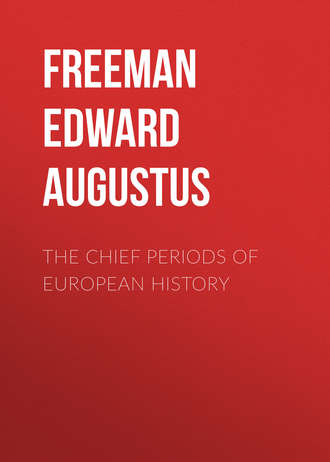 полная версия
полная версияThe Chief Periods of European History
Both Nikomêdeia and Nikaia, and Diôn’s own city of Prusa, were only ordinary provincial towns with no special privilege. But there were spots in Bithynia which were more highly favoured. Here, as elsewhere, the Roman colony, the free and allied city, were locally in the province, but not of it. It is plain that even cities of this rank were used to a good deal of meddling on the part of the Roman officers; but they resented such treatment and appealed to their privileges. Apameia was no provincial town, but a Roman colony. Diôn, who claimed to be one of its citizens, made a speech before its senate, in which he sets forth the dignity of its colonial character.[33] Pliny, more busy than other proconsuls, claimed to look over the accounts of the colony. The colonists told him that he was welcome to do so, that it was their common wish that he should do so. But he should remember that it was a thing which no proconsul had ever asked before; their ancient privileges gave them the right of managing their own commonwealth as they thought good. Pliny asks for and receives a statement of their case in writing. He thinks much of the paper irrelevant; but he sends it to the Emperor to be guided by his judgement. In all this correspondence one somehow thinks of the correspondence of Augustine and Gregory; the superior is so clearly the wiser man of the two. Trajan writes back that the straightforward dealing of the men of Apameia is to be respected; the proconsul is to tell them that it is by the Emperor’s special request that he asks to look at their accounts; he is to do so without any prejudice to their privileges for the future.[34] We here see plainly enough the difference inherent in the position of a Roman colony as distinguished from that of an ordinary town of the province. Still an Emperor and a proconsul less scrupulous than Trajan and Pliny might have made short work of the liberties of Apameia. Under the men with whom the colonists had actually to deal, those liberties, when once established by sufficient evidence, were safe.
But within the geographical limits of Bithynia there was something yet higher than a Roman colony. Amisos was an independent state surrounded by Roman territory. The city had in past times seen many settlers and many masters; it was at last delivered from its oppressors by Augustus Cæsar, and it became a free ally of Rome, bound to Rome only by the terms of its treaty.[35] We know not what those terms were; they may, like treaties with Gades and Aitôlia, have formally bound Amisos to respect the majesty of Rome, or they may not. That difference mattered little to a commonwealth whose geographical position compelled it in any case practically to respect that majesty. But it mattered greatly that, within its own walls, Amisos was by right perfectly free, governed by its own laws, which might or might not agree with the laws of Rome. Still it is plain that its treaty rights could not always secure the commonwealth from the meddling of Roman proconsuls. And it again marks the difference between the servant and the master that Pliny speaks of the liberties of Amisos as existing by the indulgence of Trajan, while Trajan himself grounds them directly on the faith of treaties. The proconsul asks if an eranos, a benefit club, is to be allowed in Amisos. Such a question marks the way in which the rights even of a perfectly free city were liable to be interfered with. Trajan, as we have seen in the case of the Nikomêdeian firemen, had a great dislike to unions and societies of any kind which might possibly be turned to political ends. No eranos is to be allowed in any city that is subject to the laws of Rome. But at Amisos, a city ruled by its own laws, Pliny is not to interfere with the establishment of such a body. The way in which the great Emperor speaks is remarkable. The might of Cæsar stands disarmed before the majesty of treaties. Trajan carries out a certain policy wherever he has the legal right to do so; where he has no such right, he forbears. Yet his words seem to imply that even he, the just Emperor, might have interfered with the rights of the free commonwealth, had he seen really good cause for doing so.[36] What other Emperors and other proconsuls did, with or without cause, it is easy to guess.
It is not at all wonderful if most of the business done by the assemblies of these commonwealths had to do with religious and social matters, and again with formal and trifling matters, with votes of honours, statues, and the like. As Diôn several times tells them implicitly, as Plutarch tells them more directly, the decision of greater matters had passed into other hands. The point is that these cities still kept the form of commonwealths, commonwealths that must have passed most of their lives in fear and trembling, but still commonwealths, even if in fetters, not mere municipalities, such as we are used to in our own day. In Eastern Europe and Western Asia this state of things is the direct and necessary consequence of the events of the Polybian age. The history of the Roman power in Western Europe is a wholly distinct subject. There Rome did not enslave or destroy, but created. The towns of the West looked forward, while the Greek commonwealths looked backward. The gradual extinction of these last was the necessary consequence of later changes, of changes which followed on the centralizing and despotic tendencies of the later Empire. Much of local independence had vanished between Strabo’s day and Pliny’s; the Lykian League itself was a thing of the past when Trajan respected the privileges of Amisos. How late any traces of freedom lingered we need not here inquire. My present object is to show the long abiding effects of the peculiar process by which the Roman dominion was definitely formed in that great determining period of the world’s history which is marked by the second century before Christ.
1
May 29, 1885.
2
History of Federal Government, i. 208.
3
Polybios, xxx. 519; xxxi. 7, 16, 17.
4
Strabo, xiv. 3, vol. iii. p. 219, Tauchnitz.
5
Καὶ περὶ πολέμου δὲ καὶ εἰρήνης καὶ συμμαχίας ἐβουλεύοντο πρότερον, νῦν δ' οὐκ εἰκὸς, ἀλλ' ἐπὶ τοῖς Ῥωμαίοις ταῦτ' ἀνάγκη κεῖσθαι, πλὴν εἰ ἐκείνων ἐπιτρεψάντων ἢ ὑπὲρ αὐτῶν εἴη χρήσιμον. That is to say, the right had never been formally taken away; only it practically could not be exercised.
6
In writing this article I have had several times in my thoughts a controversy on “Home Rule under the Roman Empire,” which will be found in two numbers of Macmillan’s Magazine for November 1882 and March 1883. This controversy is instructive in many ways, specially as showing how utterly, and how contentedly, large parts of Roman history and Roman literature may be passed by, even by a scholar who enjoys a high repute in other branches of those subjects. The comparison between the Lykian League and the city of London comes from the second of the two articles. Its author could hardly have read the description of the League in Strabo.
7
See History of Federal Government, i. 136.
8
His Πολιτικὰ Παραγγέλματα, commonly quoted as Reipublicæ Gerendæ Præcepta.
9
A still closer parallel might have been found up to the present reign, as long as the Deans of the churches of the Old Foundation were chosen by the Chapters. By long-standing custom a nominee of the Crown was always chosen, though there was not, as in the case of the election of Bishops, any legal obligation so to do.
10
C. 5. ἢ τοῦ βαλανείου διδόντες ἢ πυῤῥίχας τινας ἢ μονομάχων θεάματα παρασκευάζοντες ἀεὶ δημαγωγοῦσι, μᾶλλον δὲ δημοκοποῦσι.
11
C. 10.
12
C. 17. ἀρχόμενος ἄρχεις, ὑποτεταγμένης πόλεως ἀνθυπάτοις, ἐπιτρόποις Καίσαρος.
13
C. 32. ἐλευθερίας δὲ ὅσον οἱ κρατοῦντες νέμουσι τοῖς δήμοις μέτεστι, καὶ τὸ πλέον ἴσως οὐκ ἄμεινον.
14
C. 32. ποία δύναμις ἣν μικρὸν ἀνθυπάτου διάταγμα κατέλυσεν ἣ μετέστησεν εἰς ἄλλο.
15
C. 19. οἱ πάντι δόγματι καὶ συνεδρίῳ καὶ χάριτι καὶ διοικήσει προσάγοντες ἡγεμονικὴν κρίσιν ἀναγκάζουσι ἑαυτῶν μᾶλλον ἢ βούλονται δεσπότας εἶναι τοὺς ἡγουμένους.
16
C. 18.
17
C. 17.
18
Ibid. ὁρῶτα τοὺς καλτίους ἐπάνω τῆς κεφαλῆς.
19
Oration vii. Εὐβοϊκὸς ἢ Κυνηγός.
20
Oration xxxvi. Βορυσθενικός.
21
Oration xxxi. vol. i. p. 364, Dindorf. ταῦτα ἐν δημοκρατίᾳ καὶ παρ' ὑμῖν, οἱ μέγιστον φρονεῖτε ἐπὶ τῷ νόμισμως καὶ δικαίως διοικεῖν τὰ παρ' ἑαυτοῖς.
22
Ibid. p. 380. τοῖς μὲν γὰρ [Ῥοδίοις] μόνον ὑπάρχειν τὴν ἐλευθερίαν δίχα Ἀθηναίων.
23
Ibid. p. 350. τῆς λοιπῆς Ἑλλάδος τρόπον τινὰ ἐσβεσμένης μόνους ἐφ' αὑτοῖς διαφυλάξαι τὸ κοινὸν ἀξίωμα τῶν Ἑλλήνων εἰς τὸν νῦν παρόντα χρόνον. So p. 398; μόνοι καταλείπεσθε τῶν Ἑλλήνων οἷς ἂν καὶ παραινέσαι τις καὶ περὶ ᾧ ἔστιν ἔτι λυπηθῆναι δοκούντων ἁμαρτάνειν.
24
Ibid. pp. 359, 380, 381, 387, 393.
25
Ibid. pp. 367, 383.
26
See the forty-third and forty-fourth orations.
27
Once perhaps in the home orations, xliv. (vol. ii. p. 117); εὖ γὰρ ἴστε ὅτι τὴν μὲν λεγομένην ἐλευθερίαν, καὶ τὸ ὄνομα τοῦθ', ὃ παρὰ τῶν κρατούντων καὶ δυναμένων γίγνεται ἐνιότε οὐ δυνατὸν κτήσασθαι.
28
Oration xxxviii. Πρὸς Νικομηδεῖς περὶ ὁμονοίας τῆς πρὸς Νικαιεῖς. vol. ii. pp. 74, 75, 76.
29
Ibid. p. 80.
30
Epp. Plini et Trajani, 31, 33, 34, 37, 39, 40, 41, 48, 49, 70, 71, 74, 81, 90.
31
Ep. 34. “Tibi quidem secundum exempla complurium in mentem venit posse collegium fabrorum apud Nicomedenses constitui. Sed meminerimus provinciam istam et præcipue eas civitates ejusmodi factionibus esse vexatas. Quodcumque nomen ex quacumque causa dederimus iis qui in idem contracti fuerint … hetæriæque fient.”
32
In Ep. 81 there are references to Diôn himself. He was a Roman citizen.
33
Oration xli. vol. ii. pp. 103, 105.
34
Plin. et Traj. Epist. 47, 48 (56, 57). The claim of the colony is “habuisse privilegium et vetustissimum morem arbitrio suo rem publicam administrare.” The Emperor’s answer is, “Remuneranda est igitur probitas eorum, et jam nunc sciant quod inspecturus es ex mea voluntate salvis, quæ habent privilegiis esse facturum.”
35
See its own citizen Strabo, xii. 3 (iii. 24 Tauchnitz). The Dictator Cæsar delivered it from Pharnakês; Antonius παρέδωκε βασιλεῦσι, εἶτ' ἠλευθερώθη πάλιν μετὰ τὰ Ἀκτιακὰ ὑπὸ Καίσαρος τοῦ Σεβάστου καὶ νῦν εὖ συνέστηκεν. Pliny (92 or 93) says, “Amisenorum civitas libera et fœderata beneficio indulgentiæ tuæ legibus suis utitur.” Trajan answers, “Si legibus istorum quibus de officio fœderis utuntur concessum est eranon habere,” &c. “In cæteris civitatibus, quæ nostro jure obstrictæ sunt, res hujusmodi prohibenda est.” There is another mention of Amisos in Letter 110, which reads rather like sharp practice on the part of the free and allied city, its boule and ecclesia.
36
“Possumus quo minus habeant non impedire, eo facilius si tali conlatione non ad turbas et ad inlicitos cœtus, sed ad sustinendam tenuiorum inopam utuntur.”







